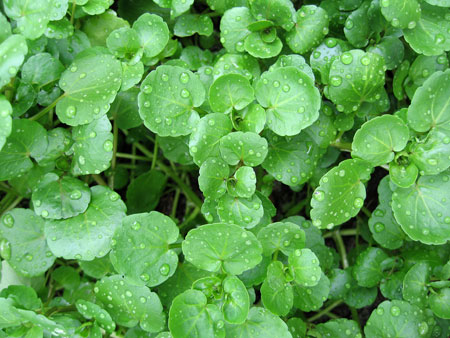Eating watercress daily is one of the ways to help people prevent the risk of cancer, British scientists said.

Watercress is a aquatic or semi-aquatic plant that lives for a long time and grows fast.
Photo: natureinthecity.org
Telegraph reported that scientists at the University of Southampton, England, conducted a study on the anti-cancer effects of watercress on four women who had breast cancer. The team asked volunteers to eat 80 grams of mustard per day. They took blood samples from 4 women before and after eating watercress and analyzed for comparison.
Scientists found that after 6 hours of eating the cabbage, the concentration and activity of a binding protein called 4E plummeted. Scientists believe that 4E proteins help cancer cells survive and thrive.
Later tests showed that chemicals extracted from watercress leaves actually prevent cancer cell growth.
In an article published in Nutrition magazine, the team confirmed isothiocyanate - the name of a group of compounds in watercress - capable of preventing the growth of cancer cells. But they have not found the anticancer mechanism of isothiocyanate. Experts will therefore have to conduct trials on many cancer patients to verify the effect of watercress.
Watercress (Nasturtium officinale or Nasturtium microphyllum) is a kind of aquatic or semi-aquatic plant, living long and growing fast. They originate from Europe and Central Asia and are one of the most popular edible vegetables for a long time. Watercress is a member of the Brassica (Brassicaceae). In terms of botany they are related to vegetables and mustard. They all have a pungent and spicy taste.
Body of watercress floating on the water. They have a feathery complex leaf. Watercress produces small white and green flowers, clustered.
Some previous studies have shown that people who regularly eat vegetables with high isothiocyanate content such as cauliflower and cabbage are at lower risk of cancer than others.
Hazel Nunn, a scientist at the British Cancer Research Center, thinks the scale of the study is too small to draw any firm conclusions.
"Watercress has many benefits to human health, but there is no reason for us to believe it can stop cancer ," she said.

 Why do potatoes have eyes?
Why do potatoes have eyes? 'Tragedy' the world's largest carnivorous life: Death becomes ... public toilet
'Tragedy' the world's largest carnivorous life: Death becomes ... public toilet Tomatoes were once considered 'poisonous' for 200 years
Tomatoes were once considered 'poisonous' for 200 years Detecting microscopic parasites on human face
Detecting microscopic parasites on human face